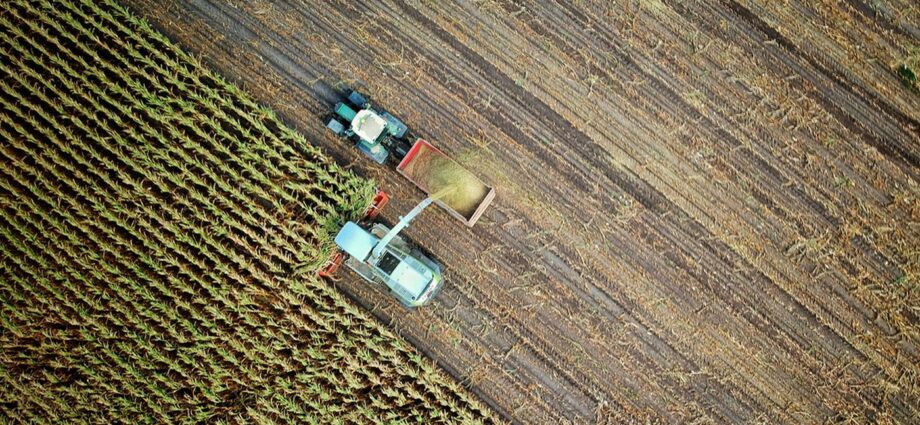
By Philip Oddi, Local Journalism Initiative Reporter, Vankleek Hill Review
September 7, 2025
Ontario farmers are facing growing uncertainty as U.S. tariffs and global trade tensions are weighing heavily on their operations. Rising production costs, volatile markets, and the stress of maintaining farm stability have many producers concerned about their finances and personal well-being.
Producers in Ontario’s $51 billion agri-food industry are among the most vulnerable due to heavy reliance on export markets, particularly Canada’s largest trading partner, the United States. Ontario Federation of Agriculture (OFA) President Drew Spoelstra says this reliance makes farmers highly sensitive during trade negotiations.

Changes in U.S. and Chinese trade policies have caused price fluctuations and higher production costs, creating ripple effects across Ontario’s agri-food chain. The U.S. currently imposes 25 per cent tariffs on steel, aluminum, and imports from outside CUSMA, the Canada-United States-Mexico Agreement.
China has imposed a 100 per cent tariff on canola oil and a 75.8 per cent anti-dumping duty on canola seed, according to the Canola Council of Canada. The Canada-China Business Council said that China has also imposed a 25 per cent tariff on pork.
Spoelstra highlighted the real-world impacts on the province’s producers: “The level of uncertainty is almost unbearable at times. Constant change continues to create unique challenges for producers,” he said. Spoelstra added that all sectors are affected differently, with greenhouse crops, meat processing, and livestock particularly exposed to tariffs.
The OFA continues to advocate for farmers at all levels of government, pushing for “expanded market opportunities, protection of supply management, and potential enhancements to financial programs to mitigate ongoing market disruptions,” Spoelstra said.
Both federal and provincial governments say they are actively supporting farmers. Measures include increasing the Risk Management Program by $100 million to $250 million, funding through AgriMarketing to access new markets, and promoting buy local and buy Canadian movements.

Ontario Minister of Agriculture, Food and Agribusiness Trevor Jones emphasized that under the Sustainable Canadian Agricultural Partnership, the government has invested $569 million to support more than 1,500 projects improving productivity, safety, environmental sustainability, and competitiveness.
“Our government will always be on the side of our agri-food industry and farmers. I will continue to build on the progress our government has achieved to ensure the sector has the support it needs to withstand anything that comes our way,” Jones said.
Member of Provincial Parliament (MPP) for Glengarry-Prescott-Russell Stéphane Sarrazin echoed this commitment, noting efforts to promote buy local initiatives and reduce interprovincial trade barriers to strengthen Ontario’s rural economy.
As trade negotiations continue, officials and the OFA say they will stay closely engaged with producers. “The agricultural community is one of my highest priorities, and I will continue to work very hard to bring Ottawa to our community,” said Member of Parliament for Prescott-Russell-Cumberland Giovanna Mingarelli.
Mingarelli said she wants to strongly encourage local businesses to work together and support one another as producers face these challenges.
Beyond financial pressures, the mental well-being of producers is also a pressing concern.
Spoelstra emphasized the importance of mental health during trying times. “There are resources available for farmers, farm families, and workers, including a 24/7 counselling service with experts who understand agriculture,” he said.
Programs like the Producer Mental Wellbeing Initiative, developed by Impact Canada under Agriculture and Agri-Food Canada, aim to support farmers whose work often extends beyond a standard 9-5 schedule and is rooted in family tradition.

Impact Canada states that Canadian producers face unique mental health and well-being challenges, many of which are compounded or heightened by the stressful and unpredictable nature of their work. In addition, stress in farming has been linked to a rise in farm work injuries and a higher risk of suicide.
Mingarelli pointed to the Do More Agriculture Foundation, a federal partner organization that offers AgTalk, a clinically supported and anonymous platform for producers to connect, share experiences, and access mental health resources.
Subscribe to our newsletter.
As global trade tensions persist, governments and producer organizations say they will continue to prioritize financial support and mental health resources to help Ontario farmers weather the uncertainty.


